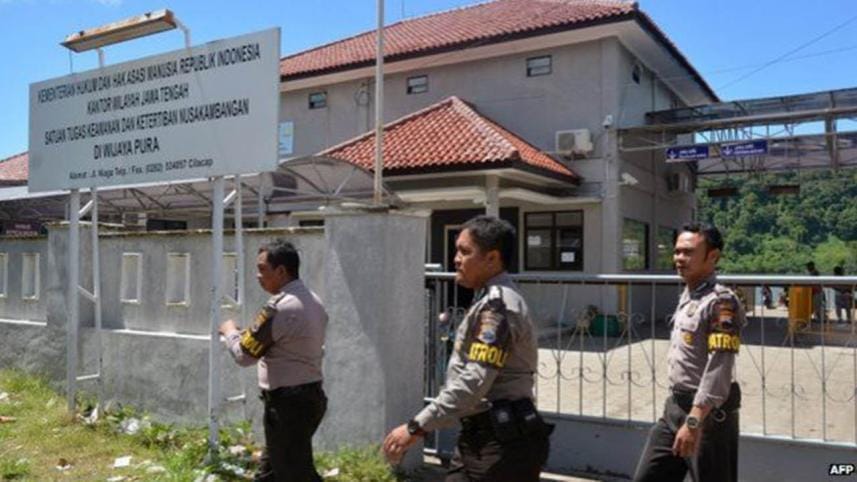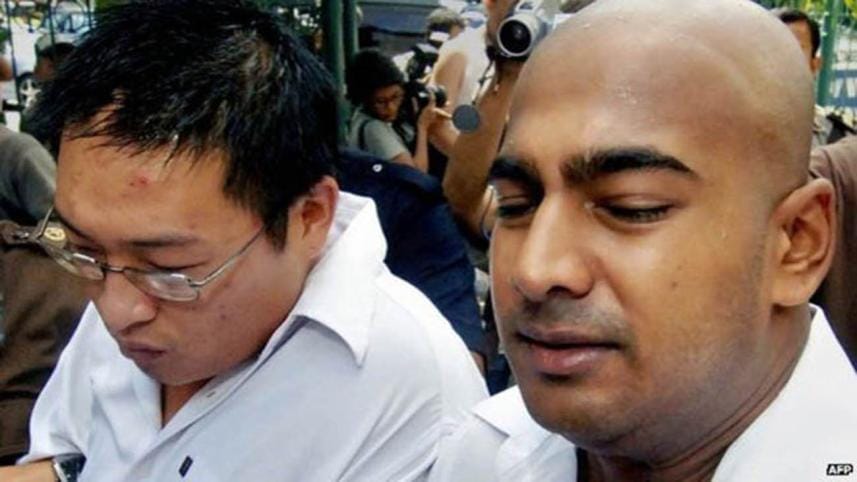Australia offers prisoner swap for Bali Nine convicts

Australia's foreign minister has offered a prisoner swap in a last-ditch attempt to save two Australian men on death row in Indonesia.
Julie Bishop said on Thursday she was waiting to hear back about the offer to repatriate three Indonesian convicts.
Andrew Chan and Myuran Sukumaran were moved on Wednesday to a prison island where they are due to be executed.
Prime Minister Tony Abbott said he had requested another call to negotiate with Indonesian President Joko Widodo.
Bishop confirmed that a prisoner swap was among the options being explored in a joint press conference with Abbott on Thursday morning.
"What we are seeking to do is have an opportunity to talk about options that might be available in the area of prisoner transfer or prisoner swap," she said.
The offer was made to Bishop's Indonesian counterpart Retno Marsudi, who "undertook to provide that information to the president", Bishop said.
The Australian government was exploring "every avenue that might be available to save the lives of these two men", she added.
Abbott said that he was seeking another telephone call with Widodo to attempt to persuade the Indonesian president to show the men mercy.
"I've put in a request. I can't guarantee that the request will be met, but I've certainly put in a request," said Abbott.
"We respect Indonesia, we honour the friendship that we have with Indonesia, but we stand up for our values and we stand up for our citizens and these are Australian citizens in extremis."
Abbott and Bishop were joined on Thursday morning by MPs and members of the public for a candlelit vigil for the men outside the parliament building in Canberra.
Chan and Sukumaran were convicted in 2005 after being caught attempting to smuggle heroin from Bali to Australia.
Indonesia has some of the toughest drug laws in the world and ended a four-year moratorium on executions in 2013.
President Joko Widodo has said the drugs trade destroys lives in Indonesia and adopted a hard line on convicted dealers.
Chan and Sukumaran left Kerobokan jail in Bali early on Wednesday morning and were flown to Nusakambangan, the high-security prison island where Indonesia conducts executions.

The date of their execution has not been announced but was expected to be this week. Al-Jazeera's Indonesia correspondent Step Vaessen said on Wednesday Widodo told her the execution would not happen this week.
The men are scheduled to be executed alongside citizens from countries including France, Brazil, Ghana and Nigeria. A woman from the Philippines also facing execution has appealed for a judicial review.
It is not clear when the executions will take place, but the authorities must legally give the convicts 72 hours' notice.
Chan and Sukumaran's relatives and supporters have pleaded for their lives to be spared, arguing that they have been rehabilitated while in jail.
France and Brazil have also protested; Paris has summoned the Indonesian envoy and Brazil's president refused to accept the credentials of the new Indonesian ambassador.
Who are the Bali Nine?
- The eight men and one woman were arrested in April 2005 at an airport and hotel in Bali, Indonesia after a tip-off from Australian police.
- They were trying to carry 8.3kg (18lb) of heroin back to Australia
- In 2006 a court ruled that Andrew Chan and Myuran Sukumaran had recruited the others and paid their costs. They were sentenced to death
- The other seven are serving sentences of between 20 years and life, after some had death sentences revoked on appeal
- Chan and Sukumaran have repeatedly appealed against their sentences and say they are reformed characters - Chan teaches Bible and cookery classes in prison while Sukumaran is an artist
Who are Chan and Sukumaran?

If the executions go ahead, it would be the second group of drug offenders to be put to death since Widodo came to power.
In January, Indonesia executed six people, five of whom were foreigners, for drug offences.
The Netherlands and Brazil, whose citizens were executed, recalled their ambassadors to Indonesia in response, saying this severely affected diplomatic relations.



 For all latest news, follow The Daily Star's Google News channel.
For all latest news, follow The Daily Star's Google News channel.
Comments